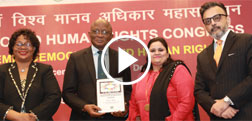|
Completed applications alongwith
enclosures including the first
year fee are to be sent to The
Admissions Officer, Indian
Institute of Human Rights, Green
Gate, A 50 Paryavaran
Complex, Saket-Maidangarhi Marg, New
Delhi - 110030 by Registered
Post only. All fees are non-refundable.
Post Graduate
Programme in Human Rights
Detailed
Curriculum
First Year
Trimester - I :
Foundation Course
Conceptual and Theoretical Understanding of
Human Rights
1.1 Introduction
to Human Rights
Human Rights,
Introduction, Definition, Historical Background,
Bases and Sources, Idea and Ethos; The UN and
its Charter, International Bill of Human Rights,
Perspectives on Human Rights and Human Duties,
Individual and Human Rights, State
Responsibility in International Law, Indian
Perspectives on Human Rights, UN Perceptions,
Emerging Dimensions in Human Rights, Future
Trends for the Third Millennium.
1.2 Principles
and Theories of Human Rights
Evolution of the
Concepts, Theories and Principles,
Internationalisation of Human Rights,
Theoretical Foundations of Human Rights, Modern
Theories of International Human Rights,
Political Philosophy,
Paradigms of Legal Philosophy, Legal Realism and
Critical Theory.
1.3. Culture,
Wisdom, Religion, and Human Rights
Human Rights and
Cultural Relativism, Religion and Human Rights,
Theological Perspectives, Impacts of the New
World Order, UN and the Challenge of Human
Rights and Cultural Diversity, Global Pluralism
and Diversity, Holistic Humanism, Indian
Traditions and Western Imagination; Ecological
Wisdom and Human Rights.
1.4 International
Relations, Democracy, and Human Rights
Human Rights
and the Theory of International Relations, The
Morality of States, International Trusteeship
and Decolonisation, Human Rights and Respect for
Life, Liberty, Justice and Equity, Political
Democracy, Survival of Cultures, Democracy,
Peace and Development, Self Determination and
Human Rights, Democracy and Education, Global
Civil Ethics, Rights and Responsibilities.
Trimester - II :
Orientation Course
Systems, Organisations and Instruments of Human
Rights
gotop
2.1 Systems for
Protection of Human Rights
Introduction to
Global Systems, The UN System, Assessing
International Human Rights Reporting Systems,
Regional Human Rights Regimes, The European
System for Protection of Human Rights, The
European Court of Human Rights, Inter-American
Human Rights System, American Convention on
Human Rights, The African System of Human and
People's Rights, African Charter on Human and
People's Rights, Constitutional Protection of
Human Rights, International Human Rights through
Ombudsman System.
2.2 Organizations
Related to Human Rights
Human Rights
Organisations - Structure and Functions, Role of
UN and Its Specialised Agencies for the
Protection of Human Rights, General Assembly,
Security Council, ECOSOC, and UN Commission on
Human Rights, The United Nations and National
Human Rights Institutions, Regional Commissions
on Human Rights.
2.3 Instruments
of Human Rights and Covenants
Historical
Antecedents of International Human Rights Law,
International Human Rights Provisions, Regional
Human Rights Provisions, National Human Rights
Provisions, International Bill of Human Rights,
Covenants on Human Rights, Human Rights
Treaties, Human Rights under National
Constitutions, International Covenants on Civil,
Political, Social and Cultural Rights.
2.4 1993 Vienna
Declaration and Programme of Action
Evolution of
Universal Human Rights, Universal Declaration of
Human Rights, Development of Covenants on Civil
and Political Rights, Algiers Declaration, Tunis
Declaration, Vienna Declaration, Programme of
Action based on Vienna Declaration,
Comprehensive Implementation and Follow up of
Vienna Declaration and Programme of Action.
Trimester - III :
Integration Course
Contemporary Human Rights Situations and Issues
3.1 Human Rights
in Global and Regional Perspectives
Human Rights as
an Issue in World Politics, Global Protection of
Human Rights, The Politics of Implementing
Rights, Human Rights in the Post Cold War Era,
Human Rights in the Contemporary World Society,
Bill of Rights for the Twentyfirst Century,
Legal and Political Arguments for a United
Kingdom Bill of Rights, The United States and
International Human Rights, Human Rights in East
- West and North - South Relations, Human Rights
in the Third World and Developing Countries.
3.2 Promotion,
Protection of Human Rights and Prevention of its
Violations
Human Rights -
Promotion and Protection, Human Rights as a
Legal Ideal, Comparative Protection of Human
Rights in Capitalist Developed World and
Socialist Third World, Human Rights Violations -
Social Contexts and Subjectivities, Genocide and
Other Crimes against Humanity - A Problem of
International Responsibility, Crime Survey and
Prevention, Rights of Disabled Persons, Monetary
Compensation for Violation of Human Rights,
Creating a Culture of Human Rights.
3.3 State of
Human Rights in India
Genesis of Human
Rights in India, Human Rights in Ancient India,
Human Rights in Islamic Era, Human Rights in
British India, Human Rights and The Constituent
Assembly, Human Rights after Independence,
Regional Analysis, Right to Equality, Civil
Rights, Political Rights, Rights relating to
Person, Right to Privacy, Economic and Social
Rights, Rights of Minorities, Rights of
Suspects, Judicial Protection, Human Rights in
India - A Balance Sheet.
3.4 Refugees,
Displaced Persons, Immigrants, and Asylum
Human Rights and
Refugees - Problems and Prospects, Uprooted and
Displaced Persons, Statelessness, Immigration,
Asylum and Anti Foreigner Violence, The Rights
of Refugees and Stateless Persons, Rights of
Persons Displaced within their own Country,
Basic Rights of Refugees in the Global and
Indian Context, Refugees in the SAARC Region,
Indian Position on the Legal Status of Refugees.
Second Year
gotop
Trimester - IV :
Specialisation Course
A) Concept Specific Themes in Human Rights
4A.1 Rethinking
and Redesigning Human Rights
Positioning Human
Rights in the Current Global Conjuncture,
Rethinking Human Rights, Challenges of Human
Rights, Struggle for Human Rights, Changing
Dimensions of Human Rights, Innovations in Human
Rights, Alternative Frame of Values, Need for an
Integrated Approach to Human Rights, Peace
Development and Democratisation, Human Rights
and the Right to be Human, Inculcating Human
Rights Culture, Human Rights - A Twentyfirst
Century Agenda.
4A.2 Expanding
Economic, Social, and Cultural Agenda
Economic and
Social Rights and Welfare, Human Rights in
Donors' Policy, Human Rights and Globalisation,
Human Rights and Transactional Corporations,
Socio Economic Rights, Socio Economic
Disparities and Violations of human Rights, The
Economic Case for Human Rights, The Economic
Imperatives of Human Rights, Human Rights and
Social Issues, The UN Social Agenda, Social
Justice and Human Rights, Realisation of
Economic, Social and Cultural Rights Education.
4A.3 Expanding
Environment and Development Agenda
Eco - Justice :
Linking Human Rights and Environment, Right to
Live in a Healthy Environment, Environmental
Laws and Human Rights. Poverty, Environment and
Sustainable Developmental Issues in Human
Rights, Right to Development as Human Right -
From Rhetoric to a Global Strategy, Integrating
Human Rights with Sustainable Human Development,
Building the Foundations of Peace, Humanitarian
Action.
4A.4 Establishing
Linkages with Other Disciplines
Human Rights and
Developing Societies; Human Rights and Equity;
Transsexual Issues and Human Rights;
Occupational Health Hazards and Human Rights;
Patients, Doctors and Human Rights; Right of the
Mentally ill; Right to Consent to Medical
Treatment; Universal Declaration on the Human
Genome; Human Rights and AIDS; Impact of
Technology on Human Rights.
B) Action
Specific Themes in Human Rights
4B.1 Human Rights
Activism and Role of NGOs
Human Rights in
Action; Human Rights Activism, Democracy and
Law; Judicial Activism and Human Rights; NGOs
and Human Rights, Role of NGOs for Implementing
UN Decade for Human Rights Education; NGOs and
Protection of Human Rights within the
UN System; NGOs, Human Rights and the Third
World; Role of National Institutions and NGOs in
Promoting Human Rights.
4B.2 Role of
Amnesty, Red Cross and National Human Rights
Commission
Introduction,
Role and Functions of Amnesty International;
Amnesty's Observations on Violation of Human
Rights in India - Pattern and Sources;
International Red Cross and Red Crescent - Role
in Enforcing the Humanitarian Law and Human
Rights Law; National Human Rights Commission -
Role, Duties and Functions; NHRC and Redressal
of Societal Wrongs; NHRC - Credibility and
Acceptance.
4B.3
Implementation, Enforcement and Realisation of
Human Rights
Taking Human
Rights Seriously, Obligation to Implement Human
Rights Provisions; Covenants in Domestic Laws;
Human Rights Implementation Mechanism at
Regional and International Levels; Role of UN in
the Implementation of Human Rights Laws and
Programmes; Ethics in Law Enforcement; Issues of
Democracy; Law Enforcement in a Free Society -
New Trends; Implementation and Enforcement of
Human Rights Under the Indian Constitution;
Realising Human Rights.
4B.4
International Humanitarian Issues, Laws
and Assistance
The Ethics of
Human Solidarity; Interface Between Humanitarian
Issues and Human Rights; Humanitarian Laws; The
Geneva Convention and Protocols; Humanitarian
Laws and Human Rights Treaties; International
Humanitarian Law, History and Development;
Independent Commission on International
Humanitarian Issues; Impact of Armed Conflict on
Children; International Human Rights Laws for
Forces Undertaking UN Operations; Human Rights
and National Emergencies, Human Rights and TADA;
Refugee Law and Humanitarian Assistance.
C) Issue Specific
Themes in Human Rights
4C.1 Child and
Human Rights
The Rights of
Children; Child Survival; Soft and Hard Rights;
Nutrition Rights; Protecting the Right to Life;
Human Rights and Female Foeticide, The Foetus
Rights as Human Rights; Abortion through the
Ages; Sex Determination and Ultrasonography;
Foeticide, Infanticide and Child Murder; Crime
Against Children; Abuses of Children Rights,
Sexual Exploitation and Child Labour; Human
Rights Violations of Street Children; Parenting
and Child Health; Child Prostitution; Child
Rape; Bonded Labour; Child Labour; Forced
Labour; Illegitimate Child; Delinquent Child.
4C.2 Women and
Human Rights
United Nations
and Status of Women, Setting the Global Gender
Agenda; The Status of Women in U S and
Scandinavian Countries; Offences, Violence and
Crime Against Women; Women Prisoners; Sexual
Harassment at Work Places; Rape Victims; Dowry
Deaths; Police Investigation and Harassment;
Strategies to Safeguard the Rights and Dignity
of Women; Human Rights of Women - International
Standards and the Indian Law; The Beijing
Declaration and Action Plan.
4C.3 Religion and
Human Rights
Impact of
Religion on Human Rights; Post Modern
Philosophies and Human Rights; Religious
Approaches to Religious Rights; Emergence of
Religious Rights; Formation of Religious
Communities; Religious Human Rights in Vedic,
Judaic, Buddhist, Islamic, Biblical, and Other
Religious Texts; Religious and Social Practices
of Dalits and Human Rights; Religious Activism
of Human Rights; Right to Freedom of Conscience
and Religion.
4C.4 Population
and Human Rights
The State of
World Population; Population Growth, Food
Security and Civil Society; Right to Adequate
Food as Human Right; Population Trends and
Policies in the Twentyfirst Century; Population
and Human Settlements; Contraception, Family
Planning and Human Rights; The Problem of
Induced Abortion and Human Rights; Direct and
Indirect Economic Measures in Fertility Policy;
New Bio-technologies, Population Policy and
Ageing.
D) Legislation
Specific Themes in Human Rights
4D.1
International Human Rights Provisions
The Rights of
Self Determination; International Convention on
the Elemination of All Forms of Racial
Discrimination and Suppresion of Apartheid;
Discrimination in Employment and Occupation
Convention; Equal Remuneration Convention;
Declaration on the Elimination of All Forms of
Intolorance and of Discrimination Based on
Religion or Belif; Declaration on Race and
Racial Prejudice; War Crimes and Crimes Against
Humanity Including Genocide; Freedom of
Association.
4D.2 Regional
Human Rights Provisions
American
Convention on Human Rights; Convention for the
Protection of Human Rights and Fundamental
Freedoms; European Social Charter; Inter
American Convention on the Prevention,
Punishment and Erradication of Violence Against
Women, European Convention on the Excersice of
Children Rights; African Charter on the Rights
and Welfare of the Child; European Agreement on
Transfer of Responsibility for Refugees;
Amreican Convention on Human Rights to Abolish
Death Penalty.
4D.3 National
Human Rights Provisions
Introduction to
National Human Rights Provisions; The Protection
of Civil Rights Act 1955; The Dowry Prohibition
Act 1961; Child Labour (Prohibition and
Regulation) Act 1986; The Child Labour
(Prohibition and Regulation) Rules 1988; The
Juvenile Justice Act 1986; The Scheduled Castes
and The Scheduled Tribes (Prevention of
Atrocities) Act 1989; The National Commission
for Minorities Act 1992; Persons with
Disabilities (Equal Opportunities, Protection of
Rights and Full Participation) Act 1995; The
Criminal Law (Amendment) Act 1932; The Criminal
Law (Amendment) Act 1961; The Criminal Law
Amendment (Amending) Act 1966; The
Identification of Prisoners Act 1920.
4D.4 Indian
Constitution and Human Rights
gotop
Critical
Appraisal of Human Rights under Indian
Constitution, Relevant Articles; Human Rights in
India and Article 2 (7) of the UN Charter;
Indian Constitution and UN Declaration;
Universal Economic, Social and Cultural Right
and the Indian Constitution; Human Rights in the
Indian Constitution : A Comparison with China
and USA.
E) Violation
Specific Themes in Human Rights
4E.1 Torture,
Custodial Violence and Disappearances
Elimination of
Cruel and Degrading Treatment and Punishment;
Police Attrocities; Human Rights and Judicial
Wisdom; Activist's Role of Supreme Court and
High Courts' Role in Safeguarding Human Rights
Agains Custodial Crimes; Impunity - Condoning
Custodial Violance; Causes and Cure; Deaths in
Custody; National Standards Against Torture and
Custodial Death; Enforced or Involuntary
Disapperances; UN Convention Against Torture;
The Committee Against Torture; UN Support to
Victims of Torture.
4E.2 Pretrial
Detention, Undertrials and Prisoners
Human Rights and
Pre Trial Detention; Human Rights Abuses,
Sensitising Police and Judicial Personnel;
National and International Standards on Pre
Trial Detention; Right Against Arbitrary Arrest;
Treatment of Prisoners; Life Convicts; Prison
Justice and Judicial Wisdom; Model Agreement on
the Transfer of Foreign Prisoners and
Recommendations on the Treatment of Foreign
Prisoners.
4E.3 Human Rights
and Police
Police and Human
Rights, United Nations and the Police; Indian
Constitution and the Indian Police; The Itiology
and Diagnosis of Human Rights and Unfriendly
Police; Human Rights and the Practice of
Policing; Police and Fair Elections; Changing
Role of Police and Understanding of Human
Behaviour; Human Rights Friendly Police;
Priciples of Police Conduct; Development of
Values, Police Personality and Human Rights.
4E.4 Human Rights
During Emergency
Human Rights in a
State of Exception, Standards for the Third
World; Human Rights and Emergency; Provisions in
the Indian Constitution; Human Rights Standards
in the States of Emergency in the Context of
Multilateral Treaties; The Principle of
Proclamation of the State of Emergency; The
Principle of Non - Derogability of Fundamental
Rights; Principle of Proportionality; Principle
of Non - Descrimination; Principle of
Consistancy; Human Rights, State of Emergency
and the General International Laws.
F) Refugee
Specific Themes in Human Rights
4F.1 Refugee Laws
and UNHCR
Origin of
International Refugee Regime; Definition of
Refugee in International Law; 1951 Convention on
Refugees and its 1967 Protocol : Awareness and
Accession; UN Declaration on Territorial Asylum;
Refugee Protection and Human Rights Law;
International Human Rights Laws Concerned with
Refugees; International Refugee Convention and
the Indian Law; International Instruments on
Refugees, Stateless Persons and Victims of
Conflict; International Instruments on
Internally Displaced Persons; Internally
Displaced Persons Regime; Laws on Illegal
Migrants; Formulation and Adoption of Regional
Refugee Instruments; OAU Refugee Convention;
Reconceiving International Refugee Law;
Prospects of Reforming International Refugee
Law; Pertinent Executive Committee
Recommendations; Model National Law on Refugees;
UNHCR: The Organizational Framework and
Activities; UNHCR; Refugees and Others of
Concern; UNHCR and Support from Military
4F.2 Refugee
Protection and Plan of Action
Humane Protection
of Refugees; Protecting Human Rights of
Refugees; Specific Issues in Refugee Protection:
Assembly, Opinion, Expression and Religion;
Children; Detention; Education; Fair Hearing;
Family Life; Racial Discrimination; Refoulement;
Women; Temporary Protection of Refugees;
Repatriation Aid and Development Assistance;
Burden Sharing; Fiscal Burden Sharing; Basic
Legal Concepts in Providing Refugee Protection;
Asylum and Treatment of Refugees; Role of
Judiciary in Providing Refugee Protection;
Refugee Protection at Regional Level; Durable
Solutions to Refugee Problems; Refugee and
Migratory Movements; Managing Migration;
Aftermath Actions : Resettlement; Comprehensive
Plan of Actions; Keeping Peace; Promoting
Development; Humanitarian Agenda for Action.
4F.3 Refugee
Status and Humanitarian Assistance
gotop
Definition of
Refugees; Uprooted; Information on
Statelessness; Statelessness : Accession;
Internationally Displace Persons; Alienage;
Persecution; Grounds for Claiming Refugee
Status; Determination of Refugee Status;
Cessation and Exclusion; Statelessness and
Citizenship; Indian Position on Legal Status of
Refugees; Humanitarian Assistance to Refugees;
Kosovo Exodus : Lessons to be Learnt;
Humanitarian Assistance to Refugees in India;
Asylum Dilemma; Defending Refugee Rights; Return
and Reintegration; IDPs and Humanitarian
Assistance; Humanitarian Agenda for Refugees;
Safeguarding Human Security.
4F.4 Refugee
Problem and South Asia
General Overview
of Global Refugee Problems; General Refugee
Situation the World; Refugee Situation in South
Asia; Refugees in South Asian Association for
Regional Cooperation (SAARC) Region; Refugees
and Migratory Movements in South Asia; Refugees
and Human Rights : An Overview; Refugee Rights :
An Overview; Refugees and Human Rights in India;
Chakma Peace Accord between India and
Bangladesh; Changing Approaches to Refugee
Problems; Investing in Future : A Humanitarian
Agenda for Refugees; Searching for Solution to
Refugee Problem; Regional Initiatives in South
Asia; Developing a Regional Approach to Refugee
Problem in South Asia; Refugees and Regional
Securing of South Asia.
Trimester - V :
Application Course
Awareness, Teaching, Research, and
Implementation
5.1 Human Rights
Education, Teaching and Training
Human Rights
Education, Tehran Conference 1968, Vienna
Conference 1993, Role of the Central and State
Governments in Promoting Human Rights Education;
UNESCO and Its Role in Human Rights Education
for Social Change; Human Rights Education in
India and UN Decade for Human Rights Education
(1995 - 2004); Role of Government and Non-
Governmental Organisations; Human Rights
Teaching at School, College and University
Levels; Human Rights Education : The Legal
Perspective; Research Priorities in Human
Rights; Peace Keeping and Traning of
International Civil Servants.
5.2 Human Rights,
Peace, Non-Violence, and Conflict Resolution
Peace as the
Idea of Social Needs; 50 Years of UN; Peace and
Human Rights in the UN Agenda; UN Resolution on
an Agenda for Peace; The Instinct of Conflict :
The Disappearing Boundaries Between Internal and
External Conflicts; Contemporary Global
Conflicts, Global Survey of High and Low
Intensity Conflicts and Disputes; Protection of
Human Rights in Armed Conflicts; Human Rights
and Ethnic Conflict Management; Nuclear War and
Human Rights; Preventive Diplomacy and Peace
Making; The Future of Human Rights in World
Politics.
5.3 Implementing
Human Rights Standards and Required Legal Aid,
Remedies and Reforms
Setting and
Implementing International Human Rights
Standards; Legal Aid and Human Rights; Legal
Literacy; Role of Government and Non Government
Organisations; Prison Reforms and Human Rights;
Future Expectations of Human Rights; Limits of
Judicial Review; Free Legal Aid; Legal Remedies
Available in India; Legal Reforms Required;
5.4 Role of
Judiciary, Public Interest Litigation and Media
Legal Philosophy
of Human Rights; Role of Judiciary; Human Rights
Jurisprudence and Public Interest Litigation;
Judicial Independence and Human Rights;
Protection of Human Rights in Criminal Justice
Administration; Towards A Burgeoning Indian
Judisprudemce of Social Action; Media and Human
Rights Education.
Trimester - VI :
Evaluation Course
Report Writing and Thesis Preparation
6.1 Field Report
All participants
will be submitting a Field Report related to
Human Rights Education, Training, Awareness or
incidents related to Human Rights Violation.
6.2 Study Report
All participants
will be submitting a Concise Report on whatever
they have studied from first to fifth Trimester
and what interested them most.
6.3 Case Study
Report
All participants will be submitting an Actual
Case Study on Human Rights Related Issue to be
published by the Institute from time to time.
gotop
6.4 Master's
Thesis
All
participants will be submitting a Master's
Thesis based on the Project Work done by them on
a particular topic related to Human Rights,
Civil Liberties, Refugee Issues, Disaster and
Emergency Relief, Child, Women, Disabled
Persons, Drug Abuse, Conflict Resolution,
Judicial Activism or any similar issue (To be submitted along with project report evaluation fees of Rs.Six Hundred, three months before the commencement of second year examination).
|







